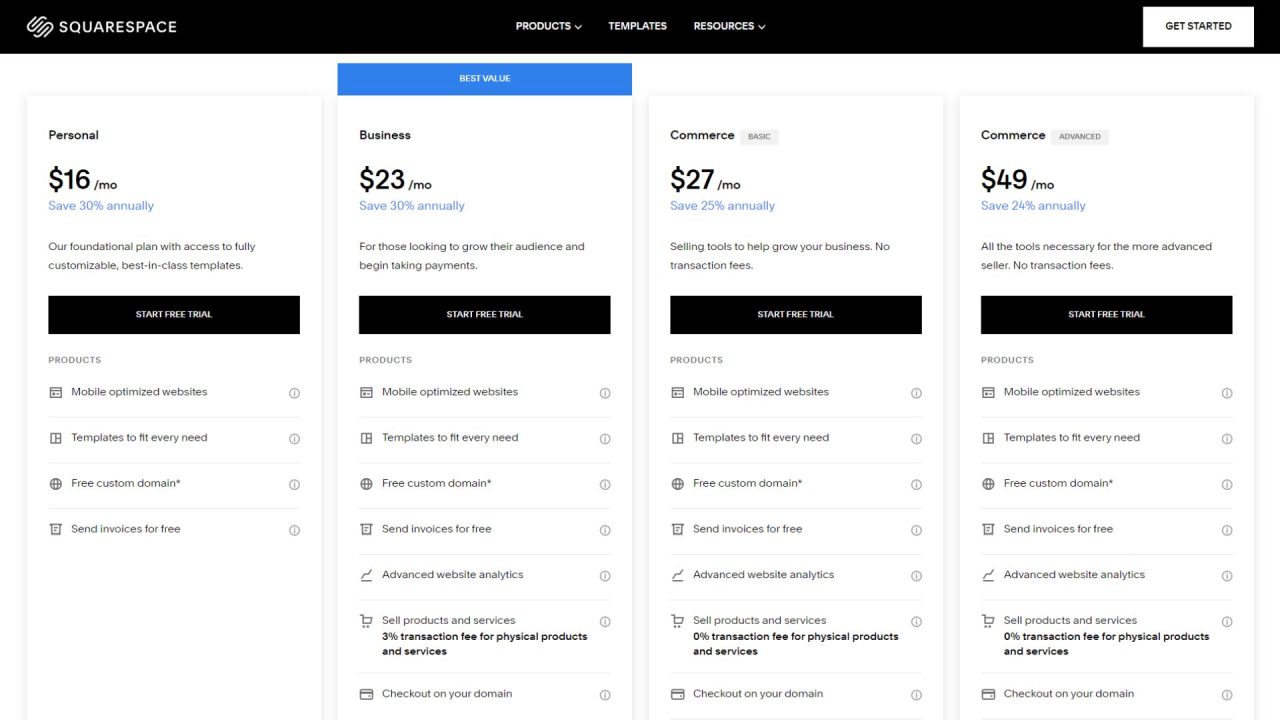
When establishing an online presence, one of the first questions many business owners have is whether they truly own their website. With Squarespace, users retain ownership of the content they create on their sites. This includes text, images, videos, and any other media they may upload or create within their Squarespace account. Users have the autonomy to manage their content, and if they choose to leave the platform, they can take their domain and export their content, albeit losing some platform-specific features such as custom CSS and scripts.
However, while users own their content, they do not own the Squarespace platform itself. The infrastructure that powers Squarespace sites—the templates, the website builder tools, and the hosting environment—remains the property of Squarespace. Should the company cease operations, websites hosted on the platform would also be affected, which brings to light the importance of platform independence.
For this reason, it’s worth mentioning alternatives such as WordPress (in fact, at Chillybin we only use WordPress to build websites). WordPress, as an open-source platform, presents a different kind of ownership where users have more control over their site’s infrastructure and template. This includes a wider range of hosting options, extendibility through plugins, and the ability to modify the source code. These account features attract users looking for a more hands-on approach and a higher degree of ownership over both the content and the structure of their websites.
Table of Contents

Ownership and Control of Content
Creating a website on Squarespace means you hold the keys to your content, with the assurance that you are in charge of the text, images, and other elements you craft for your online presence.
Understanding Squarespace’s Role
Squarespace makes its Content Management System (CMS) easy to facilitate website creation and design without the need for advanced coding skills. Users can upload content and arrange it within Squarespace’s varied templates, tailoring the site to their personal experience. Despite its ease of use, it’s important to acknowledge that the platform serves as the foundation upon which websites are built; it doesn’t bestow ownership of Squarespace’s underlying software or the operational framework.
- Hosted Platform: Squarespace maintains the infrastructure, updating and managing it so users don’t have to.
- Template Usage: Users select from a variety of templates, which remain Squarespace’s intellectual property.
User Rights and Responsibilities
When leveraging Squarespace to establish an online site, the user possesses full ownership over their original content but must navigate within Squarespace’s regulations.
- Ownership: You own the rights to the content you create and publish.
- Transferability: It is possible to migrate to other platforms if desired.
- Terms of Service: Squarespace has the sole discretion to decide if content adheres to their policies.
- Removal of Content: Squarespace can take down any material found in conflict with their terms.
Despite these provisions, there are other more user friendly content management systems like WordPress that offer a higher degree of flexibility and ownership autonomy. Moving to an open-source solution such as WordPress might provide you with a broader range of customisation options and control over your website, potentially leading to a website more tailored to specific needs, especially if you’re comfortable handling a bit more of the technical side or hiring a professional to assist.
Domain Management
Managing a domain through Squarespace involves understanding the processes for registering, transferring, and establishing ownership.
Registering a Domain with Squarespace
Squarespace allows users to register a custom domain name directly through its platform. This convenience offers users the ability to search for and secure a domain name that fits their brand or personal identity without needing to go through a separate registrar. When purchasing a Squarespace domain, users benefit from a straightforward setup where the domain is automatically connected to their Squarespace account.
Transferring and Pointing Domains
Users can transfer a domain to Squarespace from another registrar to centralise their website and domain management. Conversely, Squarespace domains can also be pointed or transferred out to other platforms or registrars if desired. This flexibility is beneficial for maintaining a domain name while exploring other website management systems such as WordPress, which allows for a broader range of customisation and control.
Custom Domain Ownership Details
When a custom domain is registered with Squarespace, the purchaser is the owner of the domain. Squarespace acts as a middleman and facilitates the process of registration and connection to their web services, but does not retain ownership of the custom domain itself. Owners have the autonomy to manage their domain settings or choose to host their website elsewhere, like with WordPress hosting services that might offer additional features or specific integrations suited to different needs.

Web Hosting and Services
Choosing the right platform for web hosting is crucial as it serves as the foundation for your website’s presence on the internet. Squarespace offers a solution with its built-in hosting services, simplifying the process.
What Hosting on Squarespace Means
When selecting Squarespace as a provider, users receive web hosting services as part of their package. This approach streamlines the step of finding a separate host, as Squarespace both hosts and provides tools for building websites on its platform. It is important for users to understand that while they retain ownership of their content, Squarespace manages the technical aspects of the online presence. Additionally, Squarespace’s hosting service includes features such as domain registration, SSL certificates, and e-commerce capabilities. However, it is worth noting that Squarespace has control over the server-side operations, which can mean less flexibility for the user in terms of server configuration and access.
Comparing Squarespace to Other Hosting Services
While Squarespace is a convenient choice for those wanting an all-in-one package, it falls short compared to alternatives like WordPress when it comes to customisation and control. WordPress, used with a hosting provider such as Bluehost or SiteGround, allows users to have more control over their hosting environment and server settings. Additionally, WordPress offers a vast repository of themes and plugins, which enables a higher level of customisation for those seeking a unique or highly tailored website. Unlike Squarespace, where users operate within a closed system, WordPress offers an open-source platform, which can be particularly advantageous for those with specific hosting needs or who prioritise full ownership and control over every aspect of their website.
Building Squarespace Sites
When creating a Squarespace site, users gain access to a range of templates and advanced customisation features suited for various website needs. These capabilities enable users to shape their online presence with greater control over the design and functionality.
Using Squarespace’s Templates
Squarespace offers a selection of templates designed to cater to diverse website layouts and types, ranging from blogging sites to ecommerce stores. These templates provide a notable starting point for individuals and businesses looking to establish an online space. For example, users can choose from templates that accentuate visual media for artists or structured designs for online retail. Although these templates simplify the website creation process, they may limit creativity to predefined layouts, which can be a setback for those seeking a more unique online identity compared to platforms like WordPress, where the potential for customisation is broader.
Advanced Customisation Capabilities
Squarespace permits further site customisation through the use of CSS and HTML injection, offering users the opportunity to modify their site beyond the basic template limitations. For those with technical knowledge, tweaking the source code can lead to more distinctive site characteristics, significantly impacting blogging effectiveness, SEO performance, and overall user experience. This advanced modification, however, generally requires an understanding of web development principles. In this regard, platforms such as WordPress provide greater flexibility and control, as they allow direct access to the site’s underlying source code, enabling a wider range of customisations without the constraints of a proprietary platform.
Move your existing website to a better platform – where you remain in control.
Ready to level up your online presence? Our tailored WordPress migration service can make it happen. Contact us to start your migration project.

Exporting and Migrating Content
When it’s time to leave Squarespace, users have the capability to export their content (something Squarespace makes quite easy), rendering the transition to another platform like WordPress achievable.
The Process of Exporting Squarespace Content
The initial step in moving away from Squarespace involves the creation of an XML file, which encompasses the site’s data required for the export process. Users can generate the file directly in Squarespace, accommodating the import of specific content types into WordPress. This process primarily includes:
- Pages: Certain basic page types are transferable.
- Blog: The blog’s text and images can be exported.
During the export, users receive a notification email containing the download link for the XML file. It is imperative to act swiftly, as the link remains active for only 24 hours.
Options for Content Migration
After acquiring the XML file from Squarespace, the user is faced with decisions regarding the transition of their site:
- Choose a New Host: Selecting a suitable web hosting provider compatible with WordPress is the first step after exporting content from Squarespace.
- Import to WordPress: Users can effortlessly transfer their data by accessing the WordPress dashboard and utilising its import function.
Although all content may not be transferable through this automated process, WordPress provides flexibility for additional customisations and manually managing the content that was not included in the XML file.
User Experience and Support
Squarespace places a high emphasis on design and user experience, ensuring that websites not only look professional but are also accessible to visitors. Their customer support aims to provide users with the guidance they need to effectively manage their online presence.
Optimising Squarespace for Visitors
Squarespace websites are designed with the visitor in mind. The platform’s customisable templates are crafted to be visually appealing and responsive across devices, enhancing the user experience. They offer a variety of design options that allow website managers to create a professional and user-friendly site with minimal effort. Accessibility is also a factor, with tools available to help users ensure their site can be navigated by everyone, aligning with web accessibility standards.
Benefits of Squarespace Customer Support
Squarespace provides various support services for its users, including 24/7 email support and live chat available during business hours. This support can be crucial for users when they encounter any issues or need assistance with their account settings or website configuration. Additionally, Squarespace has an extensive knowledge base accessible to all users, which includes tutorials, guides, and community forums to help with self-service troubleshooting.
In contrast, platforms like WordPress offer a more comprehensive approach to customer support. WordPress’s large community of developers and users contributes to an extensive range of forums, tutorials, and guides. This can be particularly beneficial for those who need specialised support or wish to add custom functionalities which may not be as straightforward on website builders like Squarespace.

Legal and Policy Considerations
When using Squarespace as your website platform, it’s important to understand how the legal agreements you enter into affect your rights and responsibilities as a user.
Squarespace’s Acceptable Use Policy
Squarespace has established an Acceptable Use Policy (AUP) to guide users on what is considered proper use of the platform. Violating this policy can lead to suspension or termination of services at Squarespace’s sole discretion. Users should therefore be aware that non-compliance could disrupt their website’s availability.
- Prohibited content or actions: Details specific types of content and behaviours that are not allowed on the platform.
- Reporting abuse: Offers a mechanism for reporting violations of the AUP.
- Consequences: Outlines the potential actions Squarespace might take in response to AUP violations.
Copyright and Content Ownership
The ownership of content on a Squarespace website remains with the user. As the creator, you are solely responsible for the copyright of your materials, ensuring that all content uploaded or shared complies with existing copyright laws.
- Responsibility for content: You maintain legal responsibility for all content on your website.
- Transferability: If you decide to move your website, you can migrate your content since you retain ownership.
- Liability: Squarespace is not liable for user-generated content, which is important should there be legal questions regarding your materials.
Other platforms, like WordPress, may offer more flexibility and control, allowing users to select different hosting providers according to their own terms of service and acceptable use policies. This variety can be attractive for users looking for specific hosting agreements that may offer different levels of control over their content and the legal liabilities associated with it.
At Chillybin we don’t like the limitations imposed by other websites like Squarespace, so we offer a Migration Service to help move your website to WordPress. If you have any questions about migrating from Squarespace to WordPress, contact us today.










